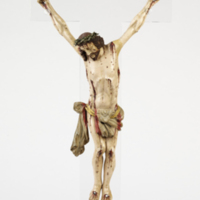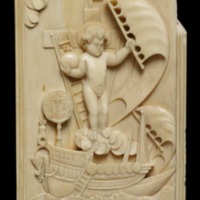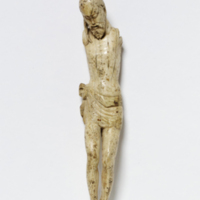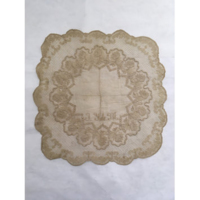Skirt Piece
Text
Cotton or piña skirt length, embroidered in five tiers with white cotton, floral and leaf design. Made up of panels, pieced together. Complete piece, not made up.
Share this
Media
Images
Map Victoria and Albert Museum
Metadata
Creator
Unknown
Subject
Flowers, Leaves
Date
ca. 1855 (made)
Identifier
8772(IS)
Other Number: 2724 - India Museum Slip Book
Other Number: 2724 - India Museum Slip Book
Origin
Madras (made)
Connection to Philippines
Contributor's note: Piña fiber is reminiscent of Philippine piña.
Materials
Cotton or piña, woven, embroidered in cotton
Physical Dimensions
Length: 758cm
Width: 210cm
Width: 210cm
Provenance
Transferred from India Museum 1879.
Short description
Textile, skirt piece, cotton or piña, embroidered, Madras, 1855.
Historical context: Intended for use as garment/clothing.
Historical context: Intended for use as garment/clothing.
Display status
Not currently on display at the V&A
Acknowledgements
Contributed by Abigail Lua, Lois F. McNeil Fellow in Winterthur Program in American Material Culture, University of Delaware
Photos courtesy of the Victoria and Albert Museum, London
Photos courtesy of the Victoria and Albert Museum, London
Official Website
Collection
Cite this Page
Unknown, “Skirt Piece,” Mapping Philippine Material Culture, accessed April 26, 2024, https://philippinestudies.uk/mapping/items/show/15407.
Subjects
Geolocation
Sensitive Content
Mapping Philippine Material Culture collates digital material from institutions, and some of this material is inherently colonial and contains words, terms and phrases that are inaccurate, derogatory and harmful towards Filipino and Filipino diasporic communities. Catalogue transcriptions, book titles, exhibition titles and museum titles may contain harmful terms. We recognise the potential for the material to cause physical and mental distress as well as evoke strong emotions. Owing to the scale of the collection’s data, a process to implement sensitive-content warnings in the displayed data is still incomplete. The material within the catalogue does not represent Mapping Philippine Material Culture’s views. Mapping Philippine Material Culture maintains a strong anti-colonial, anti-racist position and affirms its support for centring the humanity of historically marginalised and disenfranchised communities.
Facebook Twitter



